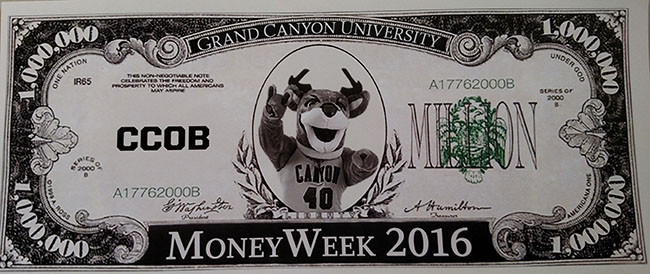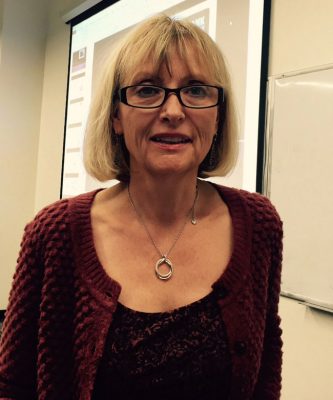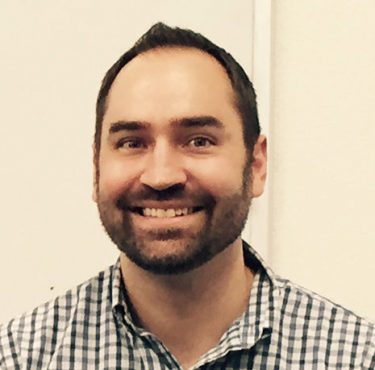
Story and photos by Laurie Merrill
GCU News Bureau
It’s not often that we are freely given priceless information.
But that’s a chief goal of Grand Canyon University’s Money Week 2016. The events, which kicked off Monday and continue through Wednesday, are free; the financial information is invaluable.
Kim Donaldson, Colangelo College of Business faculty lead, emphatically urged students to pay off their credit cards every month.

“It’s easy to be tempted to not pay it all. But they will charge you interest on the full debt,” Donaldson advised during her session on “Make Credit Cards Work For You.”
If you pay the entire balance monthly, you avoid paying interest rates that can average about 24 percent, she said, and you can avoid fees and charges, too.
Other tips:
- “Always use a credit card with great rewards,” such as a card that gives you discounts on airfares.
- “Use a zero percent introductory rate for a large purchase.”
- “Don’t use credit cards for cash advances,” as the rate is even higher.
- To achieve a good credit score, only charge up to 30 percent of your maximum credit limit. Don’t max out your credit cards.
- Avoid multiple cards and closing accounts. Both affect your credit score.
- Use your credit cards to smooth out cash flow in between paychecks as long as you pay the balance every month.
“You have to be really, really smart,” Donaldson said.

More than 30 students attended a session titled “Creating a Budget That Helps You Achieve Your Goals,” presented by Deacon Hayes of Well Kept Wallet.
Hayes discussed the seven steps to a well-kept wallet.
It starts with a budget, which is a list of all your expenses, divided into categories, and a list of your income.
Once you know your monthly expenses, you can determine whether there are categories in which you can cut back, Hayes said.
Step 2, he said, is to save $1,000 for emergencies, which are not new pants and fancy electronics, but necessities that break, such as your car engine or your kitchen sink.
Step 3 is to eliminate debt. Avoid the thinking, “Oh, I want that, let’s just put it on our card.” In this step, you systemically put a certain amount of your income toward paying down debt.
Step 4 is a three-month emergency fund. Avoid the temptation of dipping into either emergency fund or money you have set aside for paying debts to fund impulse purchases.
Step 5 is to invest 10 percent of your income into a savings or growth fund. If a GCU student puts $200 into savings every month, it will grow to $2 million after 45 years, Hayes said.
Step 6 is saving up for major purchases, such as that new car you think you will need next year.
Finally, Step 7 is giving 10 percent of your income to worthy causes.
Students were thrilled with the information after the session.
“It’s helpful stuff everybody should have,” said Hannah Kempf, a sports management student.
Contact Laurie Merrill at (602) 639-6511 or [email protected].



































































